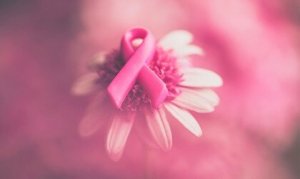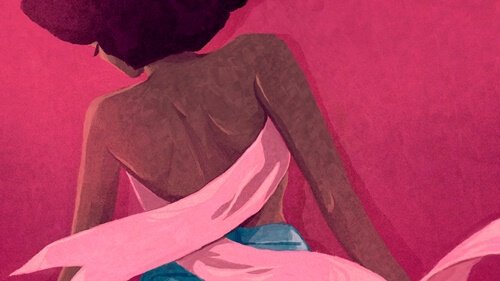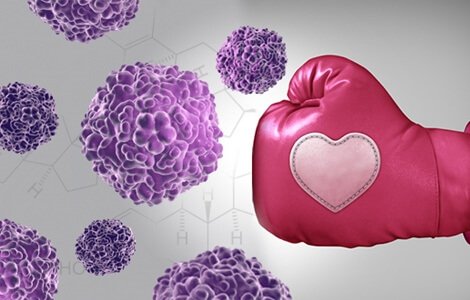Together We Can Beat Breast Cancer


Written and verified by the psychologist Valeria Sabater
Every breast cancer case is different on a molecular level as well as on an emotional level. Some cancers will be more invasive, others less so. Nevertheless, during this difficult journey, losing your hair or getting a scar on your chest is nothing. The most important thing is being alive and facing the challenge.
Science is full of surprises. Every day we hear more hopeful news about oncology and new technology to fight cancer. Treatments are more and more accurate, like in the case of immunotherapy. Experts have figured out how to “train” your body so that an antibody can guide the immune system to fight malignant cells without damaging healthy tissue. These are huge and meaningful steps forward.
While it’s true that medicine is less invasive and more accurate every day, many women are still being diagnosed with breast cancer. In fact, according to figures from the World Cancer Research Fund International, it’s still the most common cancer in women worldwide. Since the mortality rate is dropping every year, it makes sense to focus on the social and emotional impact of the disease on its survivors.
Each of these women has a name, a unique history, and a cancer with a specific biological profile. Nevertheless, what unites them all is their fear and inevitable anxiety. All of these exceptional women are forced to start this incredibly difficult journey no one is prepared for.
As a result, most of these women beat breast cancer through a transformative journey. They become role models and our greatest inspiration. They represent true hope and they show us that together we really can do anything.

Breast cancer: I’m proud of my scars
Álvaro Rodríguez-Lescure, vice president of the Spanish Society of Medical Oncology (SEOM), says that breast cancer is the type of cancer that’s most often detected. That being said, it’s worth mentioning that there are countries where lung cancer is one of the main causes of death among women. Smoking is a serious problem in certain parts of the world, and this is something we should take into account.
In spite of the fact that the survival rate for breast cancer is one of the highest, breast cancer patients still ask themselves “Why me?” The University of Western Australia did a study in 2014 that looked at women’s perception regarding the causes of breast cancer. They found that most of the participants associated breast cancer with genetic and lifestyle factors.
However, clinical studies show that only 5 to 10% of breast cancer is related to an inherited genetic mutation. The particular mutation in the case of breast cancer is of the gene BRCA1 or BRCA2. It’s clear that there are factors that increase the risk of developing this disease. However, you can safely assume that there’s still no way to prevent it entirely.
The most important thing is early detection. Experts say that the best chance of survival is with early detection using mammograms.
One woman, one story
One of the most significant milestones in the field of oncology was the discovery that breast cancers are heterogeneous. Each specific subtype requires a different treatment. As such, there will be women with more or less invasive treatments, different cycles of chemo and radiation, and different pharmacological treatments with Tamoxifen and other drugs.
Some very young women are diagnosed with this disease. Others are diagnosed while they’re pregnant. Many of these brave women refuse to let cancer interfere with their careers. They put on their headscarves, go to their chemo appointments, and try to live their lives as normal.
There are also women who want to be brave but just can’t. Metastatic or recurring breast cancer doesn’t always leave room for victory. There will be periods of remission, of course, and moments of sudden improvement. However, a diagnosis of stage 4 cancer is usually not a good sign. The stage 4 cancer stories are more delicate, more intense, and more inspiring.

Survival is a transformative journey that leaves scars
Breast cancer leaves multiple scars. You can see some of them, but others you can’t see nor appreciate. We aren’t talking about the scars on your chest. Instead, we’re talking about the scars that cancer survivors carry around in silence.
- Fear of relapsing is quite common.
- After radiation, hormone therapy, chemotherapy, and surgery, women’s libidos often decrease.
- Many are forced to accept their new image, which requires professional and social support.
- Likewise, many breast cancer surgeries require the removal of lymph nodes. This can have serious long-term effects, like lymphedema, for example. Lymphedema is the accumulation of liquid in the surgical site. In addition to accumulated liquid, the patient might also experience inflammation, pain, and limited mobility. This can make simple tasks like brushing their hair very difficult.

You have to understand that when you beat breast cancer, your journey continues. This transformation continues on a day to day basis. You have to overcome your fear and deal with the side-effects. Not only do you have to take care of yourself, but you also have to take care of others. Maybe you even care for women in the same situation.
Together, we can beat breast cancer. Breast cancer changes your life. However, your life doesn’t stop. When you have so much more to live for, your scars help make you stronger.
Every breast cancer case is different on a molecular level as well as on an emotional level. Some cancers will be more invasive, others less so. Nevertheless, during this difficult journey, losing your hair or getting a scar on your chest is nothing. The most important thing is being alive and facing the challenge.
Science is full of surprises. Every day we hear more hopeful news about oncology and new technology to fight cancer. Treatments are more and more accurate, like in the case of immunotherapy. Experts have figured out how to “train” your body so that an antibody can guide the immune system to fight malignant cells without damaging healthy tissue. These are huge and meaningful steps forward.
While it’s true that medicine is less invasive and more accurate every day, many women are still being diagnosed with breast cancer. In fact, according to figures from the World Cancer Research Fund International, it’s still the most common cancer in women worldwide. Since the mortality rate is dropping every year, it makes sense to focus on the social and emotional impact of the disease on its survivors.
Each of these women has a name, a unique history, and a cancer with a specific biological profile. Nevertheless, what unites them all is their fear and inevitable anxiety. All of these exceptional women are forced to start this incredibly difficult journey no one is prepared for.
As a result, most of these women beat breast cancer through a transformative journey. They become role models and our greatest inspiration. They represent true hope and they show us that together we really can do anything.

Breast cancer: I’m proud of my scars
Álvaro Rodríguez-Lescure, vice president of the Spanish Society of Medical Oncology (SEOM), says that breast cancer is the type of cancer that’s most often detected. That being said, it’s worth mentioning that there are countries where lung cancer is one of the main causes of death among women. Smoking is a serious problem in certain parts of the world, and this is something we should take into account.
In spite of the fact that the survival rate for breast cancer is one of the highest, breast cancer patients still ask themselves “Why me?” The University of Western Australia did a study in 2014 that looked at women’s perception regarding the causes of breast cancer. They found that most of the participants associated breast cancer with genetic and lifestyle factors.
However, clinical studies show that only 5 to 10% of breast cancer is related to an inherited genetic mutation. The particular mutation in the case of breast cancer is of the gene BRCA1 or BRCA2. It’s clear that there are factors that increase the risk of developing this disease. However, you can safely assume that there’s still no way to prevent it entirely.
The most important thing is early detection. Experts say that the best chance of survival is with early detection using mammograms.
One woman, one story
One of the most significant milestones in the field of oncology was the discovery that breast cancers are heterogeneous. Each specific subtype requires a different treatment. As such, there will be women with more or less invasive treatments, different cycles of chemo and radiation, and different pharmacological treatments with Tamoxifen and other drugs.
Some very young women are diagnosed with this disease. Others are diagnosed while they’re pregnant. Many of these brave women refuse to let cancer interfere with their careers. They put on their headscarves, go to their chemo appointments, and try to live their lives as normal.
There are also women who want to be brave but just can’t. Metastatic or recurring breast cancer doesn’t always leave room for victory. There will be periods of remission, of course, and moments of sudden improvement. However, a diagnosis of stage 4 cancer is usually not a good sign. The stage 4 cancer stories are more delicate, more intense, and more inspiring.

Survival is a transformative journey that leaves scars
Breast cancer leaves multiple scars. You can see some of them, but others you can’t see nor appreciate. We aren’t talking about the scars on your chest. Instead, we’re talking about the scars that cancer survivors carry around in silence.
- Fear of relapsing is quite common.
- After radiation, hormone therapy, chemotherapy, and surgery, women’s libidos often decrease.
- Many are forced to accept their new image, which requires professional and social support.
- Likewise, many breast cancer surgeries require the removal of lymph nodes. This can have serious long-term effects, like lymphedema, for example. Lymphedema is the accumulation of liquid in the surgical site. In addition to accumulated liquid, the patient might also experience inflammation, pain, and limited mobility. This can make simple tasks like brushing their hair very difficult.

You have to understand that when you beat breast cancer, your journey continues. This transformation continues on a day to day basis. You have to overcome your fear and deal with the side-effects. Not only do you have to take care of yourself, but you also have to take care of others. Maybe you even care for women in the same situation.
Together, we can beat breast cancer. Breast cancer changes your life. However, your life doesn’t stop. When you have so much more to live for, your scars help make you stronger.
All cited sources were thoroughly reviewed by our team to ensure their quality, reliability, currency, and validity. The bibliography of this article was considered reliable and of academic or scientific accuracy.
- Thomson AK, Heyworth JS, Girschik J, Slevin T, Saunders C, Fritschi L. Beliefs and perceptions about the causes of breast cancer: a case-control study. BMC Res Notes. 2014;7:558. Published 2014 Aug 21. doi:10.1186/1756-0500-7-558
This text is provided for informational purposes only and does not replace consultation with a professional. If in doubt, consult your specialist.







